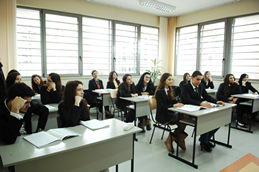Natural-Mathematical and Social Disciplines

The main goal of the training in natural-mathematical and social disciplines is to build a scientifically objective picture of the world, to get acquainted with the laws of its creation, existence and development, the mutual relations in inanimate and living matter and society. The main tasks of this training are based on the private scientific and social aspect.
The private, scientific aspect assumes:
- Assimilation of a complete system of knowledge (concepts, phenomena, facts, quantities, laws, theories and methods) in the respective discipline,
- Formation of elements of scientific thinking for solving cognitive, creative and practical tasks,
- Development of logical thinking, observation, skills for working with literary sources, for research and discussion on specific topics,
- Acquisition of skills for revealing causal relationships, for analysis of processes and phenomena.
The social aspect is related to the general nature of the training at Doris Tenedi and includes:
- Building skills for oral and written expression, collection, translation and transfer of scientific information in a foreign language,
Preparation for higher education.
The curriculum in the natural sciences, mathematics and social sciences at Doris Tenedi School fully covers the amount of knowledge and skills provided in the State educational requirements for the respective educational degree. In social terms, however, it is radically different:
- The traditional factual and descriptive approach has been replaced by a creative, problem-oriented process that encourages students to interpret and apply the mastered learning content daily. This approach is strictly used from the first to the last year of study at Doris Tenedi. It enables teachers and students to creatively interpret the learning content, including in the learning process, many independent and individual assignments and creative activities appropriate to the age of the students and the respective subject area.
- The fundamental tools of the training - the skills to read, analyse, calculate and present orally and in writing - are set at the initial level of training and are consistently strengthened every year.
To create the most favourable conditions for the academic and social realisation of its graduates, the school applies bilingual education in natural sciences, mathematics and social sciences in high school. Native language training promotes the in-depth learning of the study material, and foreign language education favours the transfer of knowledge from a native to a foreign language and vice versa. This approach allows the complete structuring of the learning content and the best selection of learning systems in the two complementary components of bilingual learning. In this way, the social aspect of Doris Tenedi's training is most fully realised.

